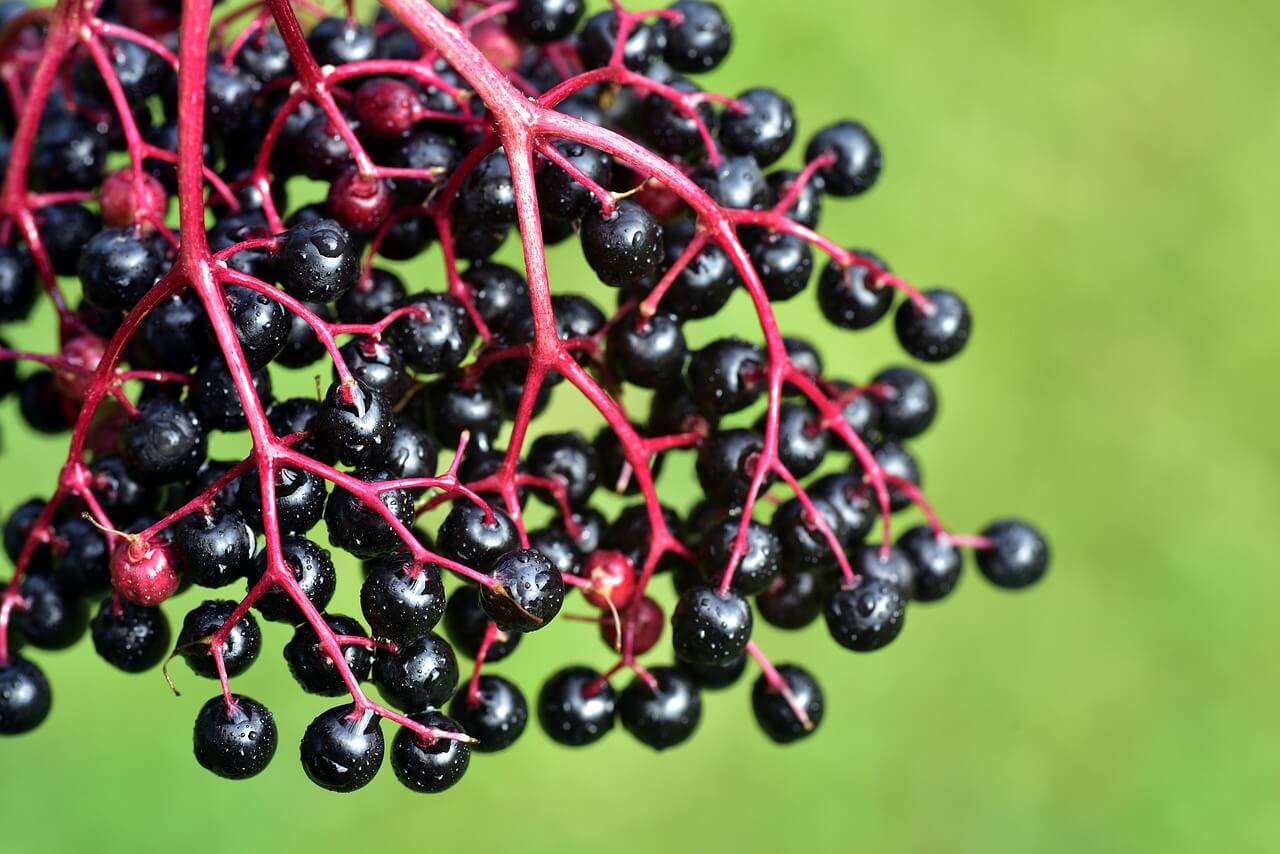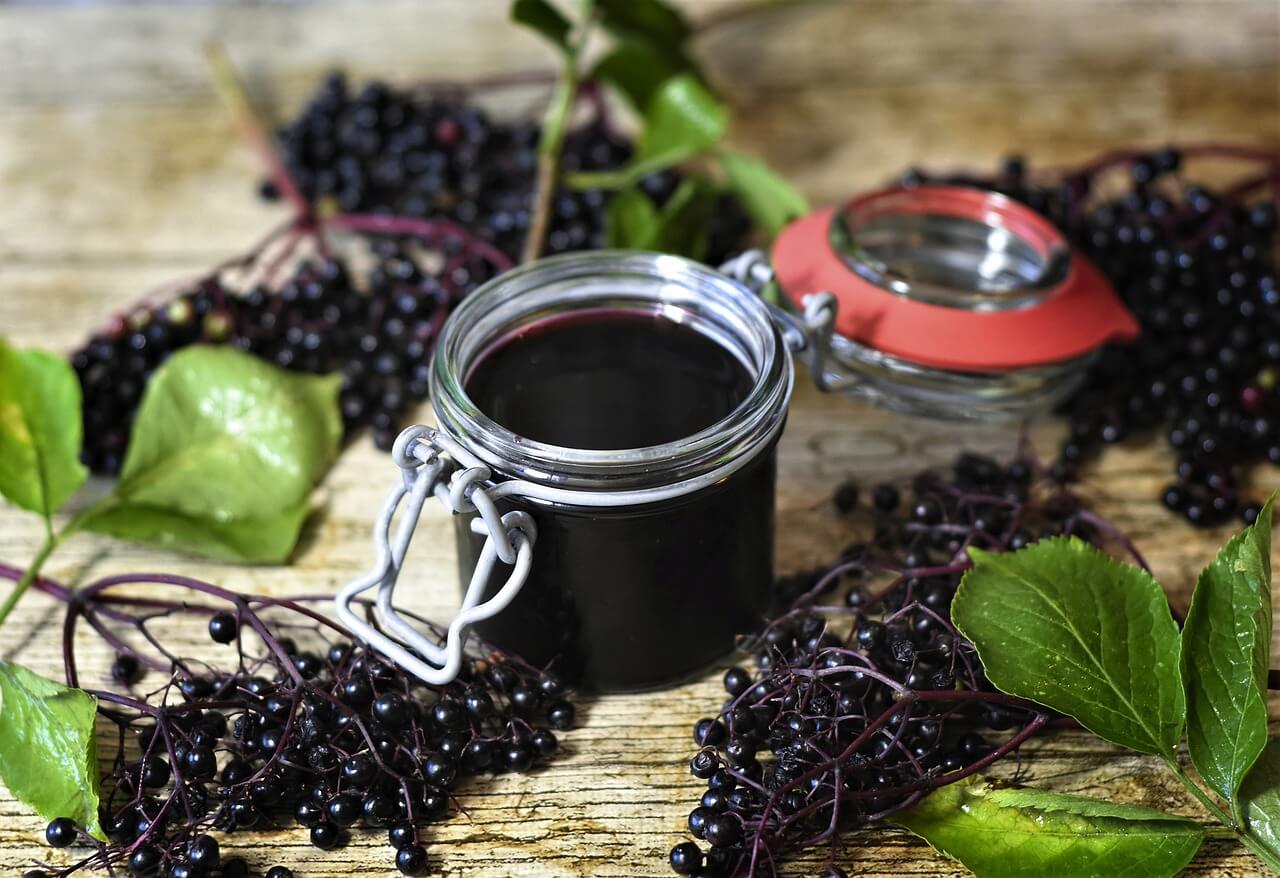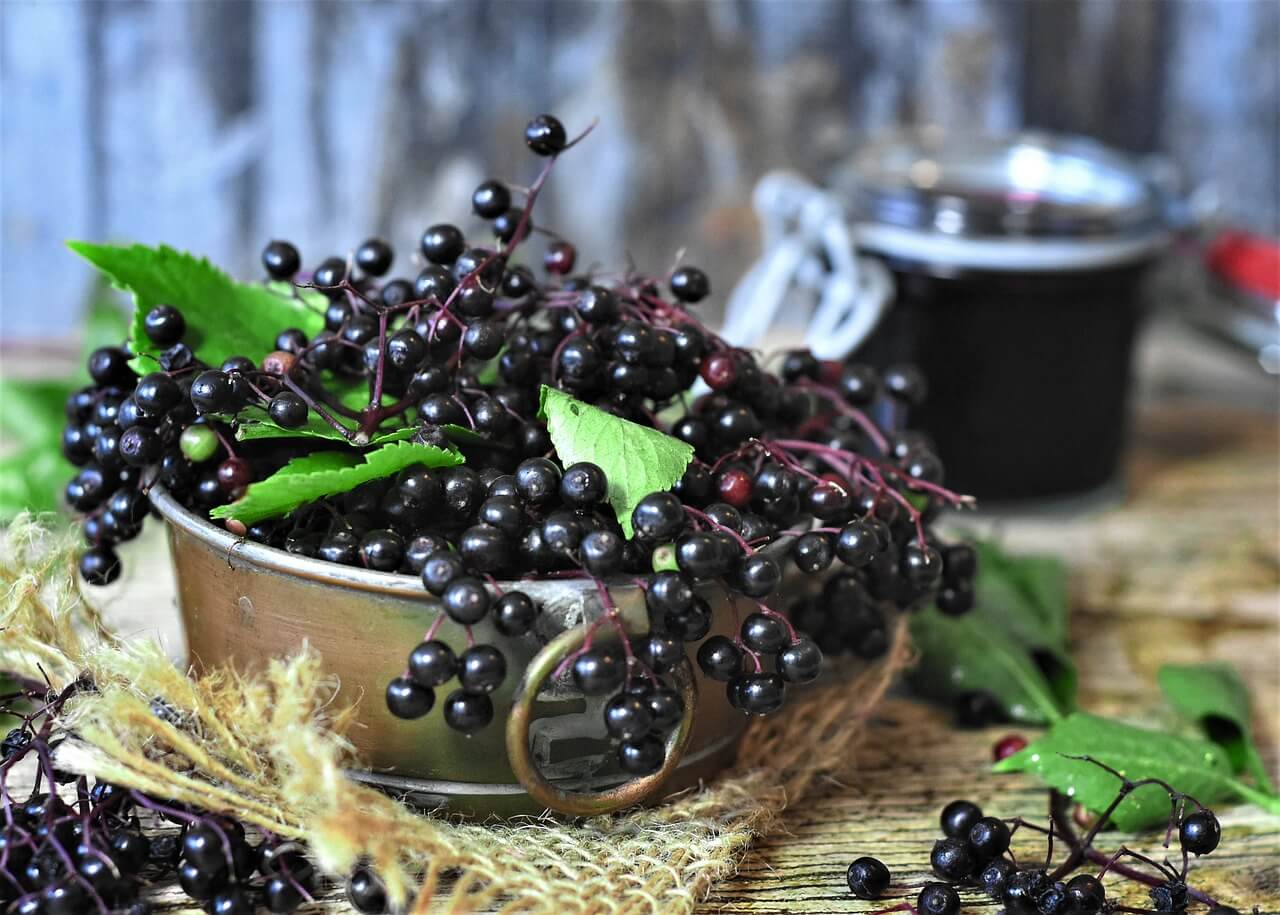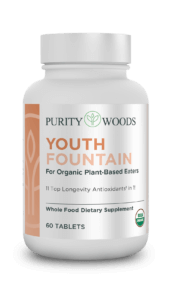It’s hard to find a more popular natural remedy than elderberries.
Elderberry especially comes out in force during cold and flu season.
It’s even become a staple ingredient in many over-the-counter products for immune support. You can find it everything from gummies to capsules to syrup. (As always, do look for USDA Certified Organic elderberry supplements, as supplements in general may be the most toxin-loaded products out there.)
Of course, the question is: Does elderberry actually work?
Yes, as you’ll see below, the health benefits of elderberry are very real!
Before that, though, here’s some fascinating background info on elderberries…
History & Folklore of the “Medicine Chest” Berry
Elderberry belongs to a group of related plants called Sambucus. The most commonly used type is black elderberry (Sambucus nigra), which is also known as European elderberry.
The use of elderberries for health likely dates back at least to ancient Egypt. However, the earliest confirmed use is in ancient Greece by Hippocrates (often called the father of medicine). He was the one who called the elderberry plant his “medicine chest.”
In fact, though the berries are most often used for health, the whole plant has a rich history of use in many traditional medicine practices.
The berries were used for influenza, various infections, digestive health, and pain. The flowers were (and still are) a remedy for fever, allergies, and inflammation. Even the bark was used as a laxative or to induce vomiting.
It’s also fascinating how the elderberry bush has been valued by many diverse cultures. It has been cultivated and used by different peoples like the Native Americans, European herbalists, and the ancient Egyptians.
Besides the highly valued health benefits of elderberry, there’s also much folklore surrounding it.
Called the Elder Tree, it was believed in some traditions to house the spirit of the Elder Mother. If you fell asleep under one, you might just be transported to faery land. It was also considered a protective tree and was favored in gardens.
Key Nutrients in Elderberry

Elderberries are rich in several health-boosting nutrients.
Most notably, one cup of elderberries contains about 87% of the recommended daily value of vitamin C, which means exceptional support for your immune system and overall health.
That same cup of berries also contains about 10.2 grams of dietary fiber. That’s just above 40% of the recommended daily value of fiber! Of course, you’d need to eat the whole berry, not just the extract found in most supplements.
Other notable vitamins include vitamin A (17% DV) and vitamin B6 (17% DV).
Iron (13% DV) and potassium (12% DV) are the most abundant minerals in elderberries. They also contain lower amounts of calcium, phosphorus, copper, and magnesium.
Top Health Benefits of Elderberry
Rich in Powerful Antioxidants
Elderberry contains several powerful antioxidants that are at least partly responsible for many of its health-boosting properties.
Anthocyanins are one of these antioxidants. They give the berries their rich purple color and are found in other dark-colored fruits like blueberries. Anthocyanins also have strong anti-inflammatory properties.
Phenolic acids and flavonols are the two other main types of antioxidants in elderberry. Quercetin is a specific flavonol that can calm inflammation and boost immunity. It’s found in elderflowers as well as in the berries.
You’re probably familiar with antioxidants as the key compounds that give anti-aging foods and herbs much of their power.
They combat aging mainly by lowering chronic inflammation in your body (which can cause disease) and counteracting damage from oxidative stress. Oxidative stress is linked to the development of many age-related and chronic diseases.
Colds and Flus

One of the most studied health benefits of elderberry is as a potential antiviral.
And while it may have an effect for helping to prevent a viral infection, elderberry is likely most powerful after you’ve already caught something.
A recent research study showed it may specifically help against influenza. Elderberry showed action against the virus through all stages, but was considerably stronger in the later stages.
Other research suggests that elderberry syrup may shorten flu symptoms by up to four days when taken within 48 hours of getting sick.
Not just for the flu, elderberries should also be considered for the common cold.
One study conducted with air travelers found that an elderberry extract reduced both the length and duration of cold symptoms.
Overall, elderberry products have one of the most well-documented effects against colds and the flu. Having it on hand when you travel and your immune system gets stressed may be especially helpful!
Immune System
Besides the potential antiviral effects, elderberry may have more general immune-boosting properties.
The health benefits of elderberry for your immune system most likely come from the powerful antioxidants in the fruit, such as the anthocyanins and quercetin.
By stimulating your immune system, elderberries may be able to enhance your body’s immune response to invaders. The berries have been found in studies to support immune health both during an infection and in healthy organisms. This means it is wise to consider consuming elderberries to support your immune health in general – not just when you get sick.
Though most of the studies done on elderberries have focused on colds and the flu, it may also help with a sinus infection.
This is based on an herbal formula used in Germany for over 70 years for sinusitis. It contains elderberry extract and was shown effective when used alongside an antibiotic in several studies. This doesn’t mean elderberry alone is proven for sinus problems, but its anti-inflammatory properties can certainly be helpful.
Overall, elderberries are an incredibly useful ally to aid or ward off an infection.
Good for Heart Health

Any food rich in antioxidants is good for your heart, but elderberry has some specific benefits for cardiovascular health.
To start with, black elderberry extract has shown it may help lower cholesterol levels.
Other studies have found that elderberry extract may also lower blood pressure and potentially protect organs from damage due to high blood pressure. So far, the research indicates that this ability comes from the presence of powerful polyphenols (antioxidants) in elderberry.
Lowering blood sugar is another of the potential health benefits of elderberry for your heart. Type 2 diabetes and high blood sugar levels put stress on your blood vessels and raise your risk of developing heart disease.
Research so far indicates that elderberry may have an insulin-like effect in the body. It may also stimulate insulin secretion and improve overall blood sugar levels.
One thing to keep in mind is that studies to this point have mostly been conducted with animals. The results have yet to be confirmed in human studies, but there’s no doubt that antioxidant-rich foods like elderberry are beneficial for your heart and overall health.
Cancer-Fighting Potential
Is there anything antioxidants can’t do?
Along with boosting heart and immune health, the specific antioxidants in elderberries have also shown anticancer potential.
One of the major studies examining elderberry and cancer examined both the commonly used European elderberry (Sambucus nigra) and the less commonly used American elderberry (S. canadensis).
The results showed that both species of elderberry possessed “significant chemopreventive potential.” In addition, American elderberry was also able to inhibit an enzyme marker called ornithine decarboxylase. This specific enzyme marker is related to the initiation stage of cancer formation.
While the complete picture of anticancer potential is still incomplete, elderberry joins a growing list of foods, spices, and herbs that may help prevent cancer.
Protects and Boosts Skin Health

Not only are antioxidants important for protecting your body from within, they are also vital for keeping your skin healthy, especially as you age.
Elderberry is full of a very familiar antioxidant that’s one of the best for your skin: Vitamin C.
Vitamin C has so many benefits for your skin. It help boosts collagen production, which in turn reduces the appearance of fine lines, wrinkles, and sagging skin. This is because collagen is the main protein in your skin and is what keeps it plump and firm. Collagen production naturally decreases as you age, resulting in several visible signs of aging.
Vitamin C can also reduce the appearance of hyperpigmentation and age spots. Even more, it may help protect your skin from further damage from things like too much sun and toxins in the environment (especially when combined with vitamin E).
Other antioxidants in elderberry may have protective properties for your skin as well. One study that examined the effects of polyphenols from several extracts found that an elderberry product may help protect against UV radiation.
Elderberries also contain a good amount of vitamin A, another nutrient with proven benefits for skin health.
While using some type of topical elderberry product can be great for your skin, research suggests that getting these vitamins and antioxidants in your diet is very beneficial for skin health as well.
Supports Digestion, Regularity, and Kidney Health
One of the often overlooked health benefits of elderberry is its support for a healthy digestion.
This could be because many elderberry products and remedies are made of some kind of extract from the fruit. The result is that all the healthy fiber from the berries themselves is left out of the picture.
If you do eat elderberries whole, though, just a half a cup of the whole berries contains about 20% of the recommended daily intake of fiber. Not only does dietary fiber help keep you regular, it also supports the good bacteria living in your gut. A healthy gut microbiome is important for good digestion but also for other things like immune health.
It’s also possible that taking elderberry tea or syrup can have a very mild laxative effect. This is because the berries contain a small amount of a compound known as anthraquinone, which is found in laxative herbs like senna and aloe.
Besides good digestion, elderberry also promotes kidney health by acting as a diuretic.
Diuretics work by increasing urination. This helps to prevent fluid retention and also keeps your kidneys continually flushing toxins out of your body.
Ways to Take Elderberry + Warming Syrup Recipe

There’s no shortage of ways to consume elderberry.
You can buy commercially made products like gummies, extracts, and capsules. Again, always look for USDA Certified Organic supplements, as supplements in general can be quite high in potential toxins you do not want to feed your body.
Elderberry teas are also available, or you can buy (or grow) the whole berries and make your own preparations. Elderberry syrup is probably the most popular homemade version, but jam, wine, and juice are also options.
Here’s a simple syrup recipe for you with some warming spices added:
- 1/2 cup dried elderberries
- 1-2 sticks of cinnamon
- 5-6 cloves
- 1/2-1 tsp. fresh ginger root
- 3 cups of water
- Raw honey
- Put the berries and spices in a small saucepan. Peel and chop or grate the ginger before adding it.
- Pour the water into the pan, and bring it to a simmer over medium heat.
- Reduce the heat and keep the syrup simmering uncovered until it reduces by 1/3-1/2.
- Once the syrup has reduced, remove from heat and strain the syrup into a glass measuring cup.
- Add honey equal to half the amount of syrup you’re left with. Stir it in completely while the syrup is still warm.
- Store your syrup in a glass jar in your refrigerator. It will keep for a month and often much longer this way.
Don’t be surprised when your syrup turns out much thinner than a store-bought syrup would be. You can thicken it by cooking it down after adding the honey, but this will destroy many of the good properties of raw honey.
Take this syrup daily or as needed. You’ll be getting the benefits of cinnamon, cloves, and ginger along with the elderberries!
Are There Any Precautions for Elderberry?
Elderberry does not have any known side effects. However, eating the berries raw can cause digestive upset because they contain a chemical that induces vomiting and diarrhea.
Cooking the berries removes this chemical, so you don’t need to worry about consuming commercial preparations or a homemade syrup that has been heated.
Some experts caution against taking elderberry if you have an autoimmune disease. This is because it can stimulate your immune system, although there aren’t any proven adverse events. It is wise to talk to your healthcare professional first before taking any supplement, and if you have an immune disorder, it may be wise to first discuss elderberries before consuming them in any form.
The #1 Way to Get Your Daily Dose of Elderberry and Nature’s Other Most Potent Foods for Your Longevity? The USDA Certified Organic YOUTH FOUNTAIN
As you’ll see, chances are very high that you’re falling short of one vital class of micronutrients (even if you’re a healthy eater).
Seeing a huge gap in the market for a highly effective supplement that provides your body these micronutrients from real-food sources — and that is also truly USDA Certified Organic and safe — Purity Woods set out to create the most effective supplement of its kind available anywhere.
And because Youth Fountain addresses this big problem facing most people today, we literally guarantee you will agree we succeeded and that you’ll quickly feel the difference!
(And right now — as you’ll see right here — you’re getting Youth Fountain for up to 32% OFF with FREE U.S. shipping if interested!)
Youth Fountain provides your body with a range of powerful antioxidants from 11 of nature’s most potent real-food sources. This includes the concentrated extracts of elderberry, beets, turmeric, triphala, cinnamon, acerola cherry, green tea, and more.
Plus, Youth Fountain contains naturally fermented ingredients to help boost its bioavailability (meaning you get even more of the health benefits)!
Yes, like all Purity Woods products, Youth Fountain is USDA Certified Organic, meaning you can rest assured it’s free of toxic, synthetic ingredients you do not want in your body (such as pesticides, toxic preservatives, dyes, and hydrogenated oils that are unfortunately so common in supplements today).
Whatever you do choose, though — for the sake of your brain, heart, liver, energy and overall longevity — please do take proper care to ensure you are getting enough antioxidants. This means both in terms of volume and a wide range of antioxidants, such as those found in one of the planet’s top antioxidant food sources, elderberries!



 Youth Fountain is the most important supplement today if you’re concerned about your brain, heart, gut, energy, and avoiding premature aging — click here now to find out exactly why that’s true!
Youth Fountain is the most important supplement today if you’re concerned about your brain, heart, gut, energy, and avoiding premature aging — click here now to find out exactly why that’s true!
Have been making elderberry jam for years and often use the flowers to make elderberry champagne! Thank you for this receipe will try it in due course
Hilary, how do you make the champagne? I’m interested. Would you mind to share the recipe?
Hi Hilary! Thanks for the tip!
Would you mind sharing the recipe for champagne?
I would also be interested in the champagne if you don’t mind sharing the recipe.
I never considered using the flowers for anything and my elderberry tree has never produced anything but flowers. Does it need another tree for cross pollination? I don’t have much room left to plant more trees after so many of my plants and trees have become so tall and wide
Wow…. who knew ?
Informative and well written article. Thank you! If I make the syrup, thoughts on how many teaspoons to have?
In my last garden I had an elderberry tree, but never managed to harvest any ripe fruit. The wood pigeons always got there first and “hoovered” them all up…. and from that I can certainly vouch for the laxative nature of the berries!!
Ha….that’s pretty funny! Sorry they beat you to the berries!
I keep Elderberry syrup, store bought , in our house almost always. I pay a lot of money for it. Although worth it, I look forward to trying this recipe.
Where can you get elderberries?
Amazon carries them dried.
This is an amazing article on Elderberries. I have used the syrup whenever I had a cold and definitely felt it was effective, but am impressed with all the anti-oxidents, etc that it contains.
Thanks so much for bringing this info to our attention!
Thank you for this extensive information! Our family began an elderberry patch on our farm 2 years ago. It takes about 3 years to get a good crop. We plan to expand and join a co op to sell organic elderberry as an alternative crop. Thank you for boosting my confidence in the reason we are growing such an amazing fruit! By the way, it is super easy and fun to grow!! You can buy seedlings and start your own patch!!
You always have a wealth of information thanks so much for all you do. Can’t wait to try some elderberries.
I ate European elderberry raw often as a child 6-8 Berry is ok / more a huge stomach
the old people made wine
This is so interesting to read. I used to make elderflower champagne, but think I’ll try the syrup. Never realised elder had so many health benefits!
I would love to make the champagne anyone willing to share the recipe and instructions please thanks
Very interesting. I knew it was good for us but didn’t know how much!
Thank you for the reminder! I tried a syrup once over the cold/flu season, it lasted about month or so, a tablespoon daily and well I did not get sick 😊 plus it was good tasting.
…interesting recipe. curious to try it out.
Brian, Are the cooked whole elderberries left after making syrup safe to eat?
you could eat them but they do have rather big seeds, which I find rather gritty, I put it though a strainer and use the puree just so it is not wasted
I was fortunate enough to collect perfectly ripe elderberries in Mammoth Lakes California this year and I recommend fermenting them in honey. Just terrific!
Love to learn how to do that too!
Really enjoyed this informative article. I planted elderberry trees a few years ago and have been fascinated by them. I have harvested the flowers for tincture and have some dried ready for this winter. I have just come across a recipe to use them in kombucha. Plan to try it in the next batch. I have had success in propagating a few more trees which will hopefully produce in 2025.
Thank you for the information i and my children has been eating these berries for years i told them it was healty, but now i know that it has such alot of healing properties . I bless you all.
I Loved this article on Elderberry
and I had no idea that Elderberry had so many health benefits for our health especially all of those antioxidants. Thank you so much for this information .
Thank you so much for this well informed article. A wealth of knowledge as always!
I will be trying this reverie. But would love to know where I can get elderberries from so I can try and grow them?
Just had to add, love the dad jokes!
Can’t help but laugh at them even though they are so stupid😁
Keep them coming!!
I pick the wild elderberries at our cabin, boil with water and put through a sieve. I put the juice in ice cube trays, freeze, bag them and we put in our daily smoothies when we are feeling sick.
At the very first sign or symptom of coming down with something, I gave my kids and myself store bought syrup 4 times a day and it always halted the progression. An amazing berry!!! ALWAYS have a bottle in my cabinet for easily 30 years. It works!!!
IN MY ALMOST 80 YEARS I HAVE NOT FOUND A BETTER COLD REMEDY I HAVE BEEN KNOWN TO KEEP 2- 4 BOTTLES IN MY HOME.I EVEN MAIL THEM TO MY KIDS TO BE SURE THEY WILL BE WELL. I AM THANKFUL FOR THIS ARTICLE ,TO FIND OUT HOW MUCH MORE IT DOES FOR OUR WELL BEING THANK YOU .
Very interesting information on Elderberries. I never had jam or cold remedy. thanks
Very informative. You are so thorough. I have known about the benefits of elderberries most of my life, but this article had so much more. Thank you.